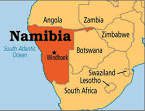Namibian President Hage Geingob has imposed restrictions on the movement of people into and out of the capital Windhoek as part of a raft of measures to contain the spread of COVID-19.
In an address to the nation on Tuesday night, Genigob said Windhoek accounted for 52 percent of total cases in the country “and is currently the epicentre in our fight against COVID-19.”
“To contain the further spread of the disease, exit and entry into the Windhoek-Okahandja-Rehoboth Local Authority Area is restricted,” Geingob said in the televised address.
Only returning residents, essential service providers in possession of relevant permits, emergency medical cases and the transportation of human remains to other regions for burial purposes would be allowed to enter or leave Windhoek and surrounding arears under the measures that became effective on Wednesday.
Other measures include a reduction in the number of people allowed at public gatherings to a maximum of 10 persons per event and the continuation of a night curfew that runs from 10pm (2000 GMT) to 4am daily.
“Face-to-face teaching and learning for primary, secondary schools and higher education institutions, including technical education providers, in affected areas is suspended effective 17 June to 30 June,” said Geingob, himself a COVID-19 survivor after recently testing positive for the deadly virus.
He added: “However, for the rest of the country the Minister of Education, Arts and Culture will announce a ‘winter holiday’, with exception for Grades 10, 11 and A-Levels who need to continue face-to-face learning in preparation for external examinations.”
All examinations for tertiary students would be undertaken online, he said.
Namibia has experienced a surge in the number of COVID-19 cases over the past four weeks.
“We have recorded an exponential increase in the number of new infections, hospitalisations and deaths recorded daily,” Geingob said.
The country has recorded over 67,000 COVID-19 cases and more than 1,040 deaths since April 2020.
JN/APA


